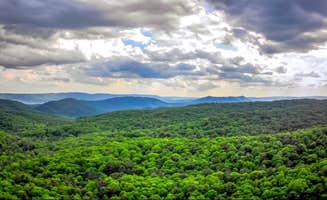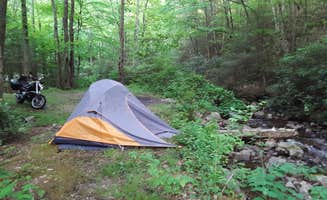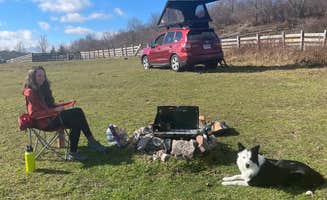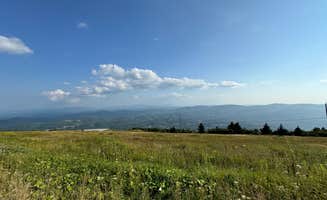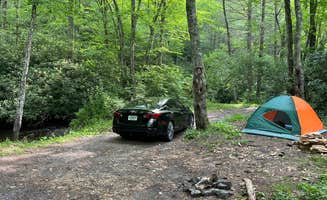Dispersed camping sites near Max Meadows, Virginia spread throughout the Jefferson and Washington National Forests at elevations ranging from 1,500 to 5,500 feet. The area receives approximately 50 inches of annual rainfall, creating lush forest conditions and numerous creek-fed camping options. Most sites require no reservations or permits, though seasonal fire restrictions apply from April through October during high wildfire risk periods.
What to do
Creek exploration: At Washington & Jefferson National Forest Dispersed Sites, campers can access multiple small swimming holes along Bear Creek. One visitor reported "we got lucky and parked right next to a swimming hole, had a gorgeous swim and enjoyed our time."
Fishing opportunities: Little Tumbling Creek offers several spots for anglers within 30 minutes of Max Meadows. According to reviews, you can find "good fishing along the way in tumbling creek" with "Laurel bed lake at top is beautiful" for additional fishing options.
Mountain biking: The Virginia Creeper Trail is accessible within 12 miles of most dispersed camping areas. One camper at Mount Rogers National Recreation Area notes "bring your bikes, fishing poles, kayaks, and hiking boots for a full week of adventure" with bike shuttle services available in Damascus to transport cyclists to Whitetop Mountain for a 17-mile downhill ride.
Wildlife viewing: Wild ponies frequently visit certain camping areas, particularly in higher elevations. A camper at Scales Trailhead Basecamp mentions "the salt lick for the ponies wasn't far" making wildlife sightings common during spring and summer months.
What campers like
Natural soundscapes: Several dispersed sites feature creekside camping that provides natural white noise. A visitor to Little Tumbling Creek enjoyed camping "next to a quiet bumbling creek with beautiful scenery."
Stargazing opportunities: Whitetop Mountain camping areas offer exceptional night sky viewing at higher elevations. A camper described "being able to star gaze" as "spectacular" while another mentioned that "the night sky was one of the most memorable moments from our trip. I've never seen so many stars!"
Multiple site options: Most free camping areas near Max Meadows have several established sites. At Walnut Flats, a camper noted "5 sites, stayed in the double site. Quiet place with plenty of firewood on the ground."
Trail access: Many sites connect directly to hiking trails. One camper at Walnut Flats mentioned a "trail right through the campground and the Appalachian trail just across the road," providing convenient hiking access without driving.
What you should know
Road conditions: Access varies dramatically between sites, with some requiring specialized vehicles. At Scales Trailhead Basecamp, a visitor warns "the road in is rocky. High clearance 4wd needed" and "probly 45 mins from the road to the campground."
Weather preparation: Higher elevation sites experience significant wind and precipitation. A camper at Whitetop cautions "THE WIND IS KILLER" and "if there's any clouds in the sky, you're literally just in a cloud of condensation. Everything is wet."
Cell service limitations: Most dispersed camping areas have minimal or no connectivity. One camper reported "absolutely no verizon service at the site" while another mentioned "no cell service at this camp, you have to go into town or hike a local mountain to get service up high."
Campsite cleanliness: Some areas require cleanup before setting up camp. At Washington & Jefferson National Forest Dispersed Sites, a visitor noted "folks tend to leave a ton of trash around, so we often spend about 20-30 minutes cleaning these sites upon arrival."
Tips for camping with families
Site selection: Choose established sites with natural boundaries for safety. One family found that at Whitetop, "we got to the top of the mountain and decided to camp near a crop of trees" which provided shelter from elements.
Water availability: Plan for no reliable water sources at most sites. A reviewer noted "there is no drinking water, picnic tables, or even pit toilet, so come prepared" when camping with children.
Activity planning: Schedule at least one major activity per day near camping areas. A parent suggested "for more of a workout, you can hop on the trail at various access points and ride uphill and coast down" when bringing children to bike the Virginia Creeper Trail.
Safety considerations: Sites near roads may experience occasional traffic. One camper warned "the spot I set up camp was very close to the road and headlights from passing cars would light up the spot" which might disturb light-sensitive sleepers.
Tips from RVers
Site dimensions: Many primitive sites can accommodate smaller RVs despite their rustic nature. At Walnut Flats, an RVer noted "level gravel drive with tent pad and lantern pole" making it suitable for modest rigs.
Maintenance access: Extended stays provide opportunity for vehicle maintenance. One RVer mentioned "I stayed just shy of 2 weeks and 1 other came in a few days after me and stayed the whole time I was there and both of us worked on our rv without any disturbances."
Road navigation: Plan extra travel time for accessing remote sites. A reviewer suggested looking for "large, very shaded, along a beautiful treelined road" sites that are more accessible than those requiring high clearance.
Resource planning: Stock all necessities before arrival. An RVer noted "the closest town is Damascus, VA, about 12 miles away" with amenities including "a decent sized grocery store, gas, and couple of restaurants."


